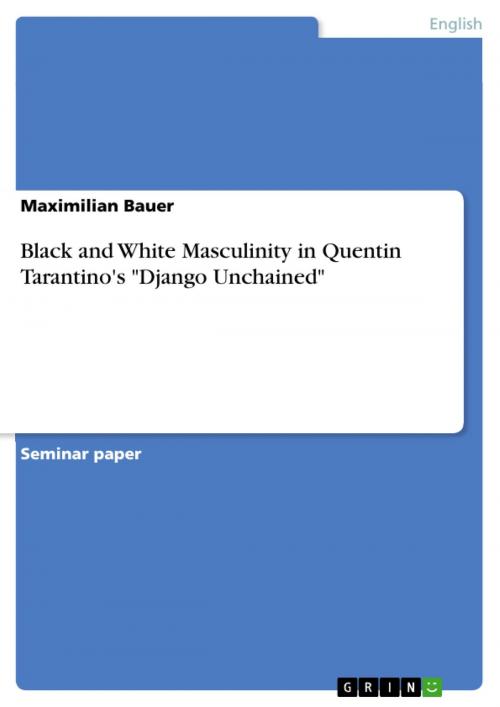Black and White Masculinity in Quentin Tarantino's 'Django Unchained'
Nonfiction, Entertainment, Drama, Anthologies| Author: | Maximilian Bauer | ISBN: | 9783668108752 |
| Publisher: | GRIN Verlag | Publication: | December 11, 2015 |
| Imprint: | GRIN Verlag | Language: | English |
| Author: | Maximilian Bauer |
| ISBN: | 9783668108752 |
| Publisher: | GRIN Verlag |
| Publication: | December 11, 2015 |
| Imprint: | GRIN Verlag |
| Language: | English |
Seminar paper from the year 2015 in the subject American Studies - Miscellaneous, grade: 2,3, University of Würzburg (Neuphilologisches Institut), course: Spezialgebiet Amerikanische Literatur 2, language: English, abstract: This paper discusses Quentin Tarantino's 2013 movie 'Django Unchained' under the aspect of black and white masculinity. It looks at stereotypical ideas of masculinity of white slave holders ans black slaves and how they are represented in the movie. Also the main characters are discussed as to their differences in masculinity and how they express it. 'Django Unchained', a movie directed by Quentin Tarantino, was released in December 2012 and won several prices. The film was discussed a lot in public mostly because of the issue of slavery the director is dealing with in the movie and about how he does it. The film had to endure many critical reviews, bad ones and good ones obviously, as many people thought of the depiction of violence as fitting considered the brutality towards slaves in the antebellum south, others thought it to be extremely exaggerated. Also the controversial use of the N-word, as named in literature and interviews, was a major part of the public discussion about ''Django Unchained'. Ultimately it is the viewer himself who has to decide if in his opinion Tarantino uses the right words and pictures to get even with the institution of slavery and the relationship between white farmers and black slaves.
Seminar paper from the year 2015 in the subject American Studies - Miscellaneous, grade: 2,3, University of Würzburg (Neuphilologisches Institut), course: Spezialgebiet Amerikanische Literatur 2, language: English, abstract: This paper discusses Quentin Tarantino's 2013 movie 'Django Unchained' under the aspect of black and white masculinity. It looks at stereotypical ideas of masculinity of white slave holders ans black slaves and how they are represented in the movie. Also the main characters are discussed as to their differences in masculinity and how they express it. 'Django Unchained', a movie directed by Quentin Tarantino, was released in December 2012 and won several prices. The film was discussed a lot in public mostly because of the issue of slavery the director is dealing with in the movie and about how he does it. The film had to endure many critical reviews, bad ones and good ones obviously, as many people thought of the depiction of violence as fitting considered the brutality towards slaves in the antebellum south, others thought it to be extremely exaggerated. Also the controversial use of the N-word, as named in literature and interviews, was a major part of the public discussion about ''Django Unchained'. Ultimately it is the viewer himself who has to decide if in his opinion Tarantino uses the right words and pictures to get even with the institution of slavery and the relationship between white farmers and black slaves.















